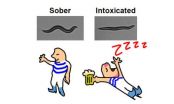(Press-News.org) Neuroscientists at The University of Texas at Austin have generated mutant worms that do not get intoxicated by alcohol, a result that could lead to new drugs to treat the symptoms of people going through alcohol withdrawal.
The scientists accomplished this feat by inserting a modified human alcohol target into the worms, as reported this week in The Journal of Neuroscience.
"This is the first example of altering a human alcohol target to prevent intoxication in an animal," says corresponding author, Jon Pierce-Shimomura, assistant professor in the university's College of Natural Sciences and Waggoner Center for Alcohol and Addiction Research.
An alcohol target is any neuronal molecule that binds alcohol, of which there are many.
One important aspect of this modified alcohol target, a neuronal channel called the BK channel, is that the mutation only affects its response to alcohol. The BK channel typically regulates many important functions including activity of neurons, blood vessels, the respiratory tract and bladder. The alcohol-insensitive mutation does not disrupt these functions at all.
"We got pretty lucky and found a way to make the channel insensitive to alcohol without affecting its normal function," says Pierce-Shimomura.
The scientists believe the research has potential application for treating people addicted to alcohol.
"Our findings provide exciting evidence that future pharmaceuticals might aim at this portion of the alcohol target to prevent problems in alcohol abuse disorders," says Pierce-Shimomura. "However, it remains to be seen which aspects of these disorders would benefit."
Unlike drugs such as cocaine, which have a specific target in the nervous system, the effects of alcohol on the body are complex and have many targets across the brain. The various other aspects of alcohol addiction, such as tolerance, craving and the symptoms of withdrawal, may be influenced by different alcohol targets.
The worms used in the study, Caenorhabditis elegans, model intoxication well. Alcohol causes the worms to slow their crawling with less wriggling from side to side. The intoxicated worms also stop laying eggs, which build up in their bodies and can be easily counted.
Unfortunately, C. elegans are not as ideal for studying the other areas of alcohol addiction, but mice make an excellent model. The modified human BK channel used in the study, which is based on a mutation discovered by lead author and graduate student Scott Davis, could be inserted into mice. These modified mice would allow scientists to investigate whether this particular alcohol target also affects tolerance, craving and other symptoms relevant to humans.
Pierce-Shimomura speculated that their research could even be used to develop a 'James Bond' drug someday, which would enable a spy to drink his opponent under the table, without getting drunk himself. Such a drug could potentially be used to treat alcoholics, since it would counteract the intoxicating and potentially addicting effects of the alcohol.
INFORMATION:
Davis and Pierce-Shimomura's co-authors at The University of Texas at Austin were research associate Luisa Scott and undergraduate student Kevin Hu.
This research was funded by the ABMRF/The Foundation for Alcohol Research, the National Institute on Alcohol Abuse and Alcoholism and the Waggoner Center for Alcohol and Addiction Research at The University of Texas at Austin.
Mutation stops worms from getting drunk
2014-07-16
ELSE PRESS RELEASES FROM THIS DATE:
Rainwater discovered at new depths
2014-07-16
University of Southampton researchers have found that rainwater can penetrate below the Earth's fractured upper crust, which could have major implications for our understanding of earthquakes and the generation of valuable mineral deposits.
It had been thought that surface water could not penetrate the ductile crust - where temperatures of more than 300°C and high pressures cause rocks to flex and flow rather than fracture - but researchers, led by Southampton's Dr Catriona Menzies, have now found fluids derived from rainwater at these levels.
Fluids in the Earth's crust ...
Transplantation of new brain cells reverses memory loss in Alzheimer's disease model
2014-07-16
SAN FRANCISCO, CA—A new study from the Gladstone Institutes has revealed a way to alleviate the learning and memory deficits caused by apoE4, the most important genetic risk factor for Alzheimer's disease, improving cognition to normal levels in aged mice.
In the study, which was conducted in collaboration with researchers at UC San Francisco and published today in the Journal of Neuroscience, scientists transplanted inhibitory neuron progenitors—early-stage brain cells that have the capacity to develop into mature inhibitory neurons—into two mouse models of Alzheimer's ...
JAMA study: Stroke risk and death rates fall over past 2 decades
2014-07-15
Fewer Americans are having strokes and those who do have a lower risk of dying from them finds a new study led by Johns Hopkins Bloomberg School of Public Health researchers.
The study found a 24 percent overall decline in first-time strokes in each of the last two decades and a 20 percent overall drop per decade in deaths after stroke. However, the decline in stroke risk was concentrated mainly in the over-65 set, with little progress in reducing the risk of strokes among young people. In contrast, the drop in stroke-related deaths each decade was primarily found among ...
Physicians struggle to clinically diagnose early HIV infection
2014-07-15
Despite the belief that early HIV infection presents with a well recognized flu-like syndrome, most physicians are unable to use clinical skills to differentiate those who should and should not be tested for HIV infection, according to a study published July 15 in Journal of the American Medical Association (JAMA).
Researchers at the BC Centre for Excellence in HIV/AIDS and University of British Columbia, Oregon Health and Science University, and Duke University Medical Centre analyzed data from over 24,000 patients, and discovered physicians have great difficulty recognizing ...
Study finds decrease in incidence of stroke, subsequent death
2014-07-15
In a study that included a large sample of black and white U.S. adults from several communities, rates of stroke incidence and subsequent death decreased from 1987 to 2011, with decreases varying across age-groups, according to a study in the July 16 issue of JAMA.
Stroke ranks fourth among all causes of death in the U.S. and is recognized as a leading cause of serious physical and cognitive long-term disability in adults. Almost 800,000 Americans suffer a stroke each year, and over 600,000 of them are first-ever events. Stroke incidence varies by gender and ethnic group, ...
Telecare intervention improves chronic pain
2014-07-15
A telephone-delivered intervention, which included automated symptom monitoring, produced clinically meaningful improvements in chronic musculoskeletal pain compared to usual care, according to a study in the July 16 issue of JAMA.
Pain is the most common symptom reported both in the general population and patients seen in primary care, the leading cause of work disability, and a condition that costs the United States more than $600 billion each year in health care and lost productivity. Musculoskeletal pain accounts for nearly 70 million outpatient visits annually in ...
History of stroke linked with increased risk of adverse outcomes after non-cardiac surgery
2014-07-15
In an analysis that included more than 480,000 patients who underwent elective noncardiac surgery, a history of stroke was associated with an increased risk of major adverse cardiovascular events and death, particularly if time elapsed between stroke and surgery was less than 9 months, according to a study in the July 16 issue of JAMA.
Noncardiac surgeries performed in patients with a recent heart attack or stent implantation have been associated with increased risk of perioperative cardiac events, as well as stent thrombosis (blood clot), and bleeding compared with ...
Physicians have higher rate of organ donation registration than general public
2014-07-15
A study that included about 15,000 physicians found that they were more likely to be registered as an organ donor compared to the general public, according to a study in the July 16 issue of JAMA.
A shortage of organs for transplant has prompted many countries to encourage citizens to register ("opt in") to donate their organs and tissues when they die. However, less than 40 percent of the public is registered for organ donation in most countries with a registry. "One common fear is that physicians will not take all measures to save the life of a registered citizen at ...
Common treatment of certain autoimmune disease does not appear effective
2014-07-15
Among patients with the systemic autoimmune disease primary Sjögren syndrome, use of hydroxychloroquine, the most frequently prescribed treatment for the disorder, did not improve symptoms during 24 weeks of treatment compared with placebo, according to a study in the July 16 issue of JAMA.
Primary Sjögren syndrome is characterized by mouth and eye dryness, pain, and fatigue, with systemic manifestations occurring in approximately one-third of patients. Despite the wide use of hydroxychloroquine in clinical practice, evidence regarding its efficacy is limited, according ...
JAMA study: Telecare program optimizing non-opioid chronic pain medication very effective
2014-07-15
INDIANAPOLIS -- Chronic pain in the back, neck and other joints due to arthritis or other musculoskeletal disorders is extremely common but difficult to treat. In a new study published in the July 16 issue of Journal of the American Medical Association, primary-care patients enrolled in a 12-month telecare program optimizing non-opioid medications for chronic pain were twice as likely to see improvement as patients who received usual care for chronic pain.
In addition to experiencing pain improvement, patients in the telecare arm of the pain management study reported ...


